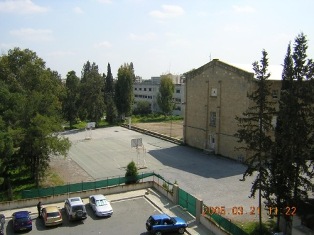
 By Ara Arabyan Ph.D.
By Ara Arabyan Ph.D.Armand Ayaltin DNM, RHP
Nurel Beylerian Ph.D.
We have been following with interest the developments concerning the Melkonian Educational Institute in Nicosia, whose 'owner', the Armenian General Benevolent Union (AGBU), has decided to shut down the school and sell the lands despite strong opposition from Armenian communities in Cyprus and elsewhere.
Just before Christmas 2006, the Cyprus Court of Appeal came down with two rulings in favour of the AGBU. The first judgment freed the properties from the protective status they had been enjoying, while the second ruling supposedly gave the AGBU the green light to liquidate the school and sell the lands, nullifying the court injunction that was obtained earlier by the Armenian Patriarch of Istanbul.
We are gratified to see that concerned individuals within the government of Cyprus have taking steps to re-instate the protection of the historic Melkonian buildings as well as the forests, which are permanent testaments to the will of the survivors of the Armenian Genocide of 1915 to fight death with renewed life. Melkonian is also a timeless testament to the good will and hospitality of the Cypriot people and authorities which is forever appreciated by Armenians throughout the world.
But our thoughts today centre around the second judgment of the Cyprus Court of Appeal, which according to the AGBU, allows it to close the school and sell the lands.
In fact, Appeal No. 58/2006 of the Cyprus Court of Appeal does no such thing.
The Court of Appeal ruling upholds the Agreement of 1926, whose three signatories are the benefactor, Mr. G. Melkonian, the Armenian Patriarch of Istanbul, and the AGBU. Let us look at just three important terms of this agreement:
* The agreement gives full rights to the AGBU to treat the properties being transferred to it as it pleases (and this is the term being used by the AGBU as justification for its planned action), * The AGBU promises to maintain the Melkonian establishments in Cyprus from the proceeds of the sale of the properties it receives, and * The AGBU promises to pay a yearly sum to the benefactor for his living expenses.
These three terms alone explain the intent of the benefactor and the trust he had in the strength of the agreement as well as the commitment he was receiving from the AGBU.
Leaving aside the issue of whether the AGBU has lived up to its promises, the key question that arises is: What properties did the Agreement of 1926 transfer to the AGBU, on which the Cyprus Court of Appeal ruling is based?
Answering this question is of vital importance because it alone sheds light on the exact meaning of the court ruling.
The 1926 agreement transfers to the AGBU several properties in Egypt, certain goods, and some company shares, with the stipulation that the AGBU should sell the transferred assets and add the proceeds to its general funds to be used for benevolent projects, the first of which is identified as the maintenance of the Melkonian establishments in Nicosia.
The 1926 Agreement specifies the assets transferred to the AGBU in meticulous detail, and they do not include the Melkonian real estate and properties in Cyprus.
Therefore, the Cyprus Court of Appeal ruling which asserts the legality of the 1926 Agreement, does not apply to the transfer of the Cyprus properties, which were part of an entirely different transaction between the Armenian Patriarchate of Istanbul and the AGBU. Mr. Melkonian was not involved in that transaction, as he never owned the properties in Cyprus. The land in Cyprus was purchased and the buildings were built by the Patriarchate.
Given that the ruling of the Cyprus Court of Appeal is based solely on the Agreement of 1926 and that this agreement is in no way associated with the Melkonian properties in Cyprus, no one has the legal justification to apply the ruling to a different transaction that took place between the Armenian Patriarchate of Istanbul and the AGBU, to which Mr. Melkonian was not even a signatory.
Doing otherwise will set a very dangerous precedent, not only for Cyprus, but also for the entire Commonwealth as well as the European Union, and we doubt very much that the Cyprus Court of Appeal intends to do anything of the sort.
The Court of Appeal decision also makes reference to the sale of part of the Melkonian property in the past. At the time, no one challenged the sale because generally it was agreed that it was a good way to guarantee the future financial viability of the school.
This sale was not intended to be the first step to liquidate the Melkonian properties, and relevant parties never forfeited their right to challenge future sales that might hinder the operation of the school.
We believe that a clarifying statement is needed from the Cyprus Court of Appeal regarding the key issue raised here: did it intend to set a precedent by applying the terms of one agreement between three sides, to an entirely different agreement between two sides?
A clear statement will go a long way toward preventing opportunistic groups from misrepresenting the decision and causing irreparable damage to a venerable institution that has honourably served Cyprus and many Armenian communities for eight decades.
Ara Arabyan Ph.D., Prof. of Mechanical Engineering, Univ. of Arizona, USA
Armand Ayaltin DNM, RHP, President, Nuvelt Ltd., Vancouver, Canada
Nurel Beylerian Ph.D., P.Eng, President, Bomar Inc., Toronto, Canada
Armand Ayaltin DNM, RHP, President, Nuvelt Ltd., Vancouver, Canada
Nurel Beylerian Ph.D., P.Eng, President, Bomar Inc., Toronto, Canada
Source: “Cyprus Mail”, Cyprus, 29 May 2007
http://www.cyprus-mail.com/news/main.php?id=32665&cat_id=1
http://www.cyprus-mail.com/news/main.php?id=32665&cat_id=1
